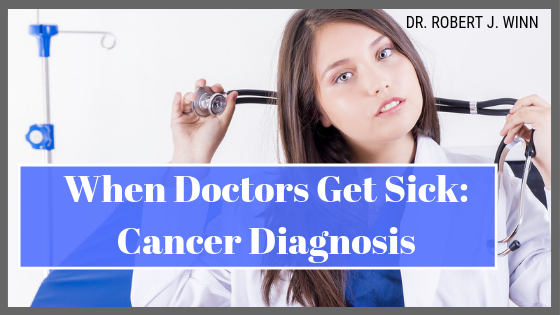Most people don’t stop to consider the health of their physicians, but doctors aren’t immune to the ailments that plague humanity. When doctors become patients, they often walk away from the experience with more empathy for their patients. Especially when the diagnosis is cancer.
Denial
Doctors tend to brush off their own symptoms of illness; many times, they overlook what they assume are only minor aches and pains. When doctors receive a cancer diagnosis, their relationship to the patients they treat and to their own physicians can become complicated. Doctors are used to being in control and having the answers; however, doctors are experts in all fields of medicine, so unless they happen to be an oncologist, their doctor will know more than them. It’s their turn in the patients’ seat and for many of them letting go of that control can be a difficult experience. The very traits that make them a good doctor can work against them as a patient.
According to Dr. Stacy Keen, who was diagnosed with breast cancer, “It was such a relief to go back to work and be a doctor again, and not a patient because it’s so much easier to give care than to get it,” she explains. “It’s more anxiety-provoking when it’s you, and you’re uncertain as to what the future is going to bring.”
New Found Empathy for Patients
Many doctors who experience a cancer diagnosis say that it changes the way they engage with their patients. Having experienced the raw emotions and challenges of a diagnosis first hand, they become more empathetic towards the patients they see.
For example, Dr. Chitra Viswanathan, who received a breast cancer diagnosis in 2011, states that she didn’t fully understand her patients’ experience until she was being treated herself. One frequent side effect of chemotherapy is hair loss of which Viswanathan says, “It’s emotionally painful to lose your hair, but it’s also physically painful. It actually hurts when it’s falling out. I didn’t know that.” Viswanathan, along with many other physicians in similar situations, believes she’s become more sensitive to the side effects of treatment.
For Dr. Nagashree Seetharamu, that new empathy also extends to patients’ loved ones. After her diagnosis, she did her best to keep her treatment from interfering with her family life, but she realized just how difficult that can be. A cancer diagnosis can affect the whole family, not just the patient. Recounting the impact her hair loss had on her son, Seetharamu says, “He wrote some essays in school regarding this and tried to minimize his feelings, and mine, with humor. He would wear my wigs and masquerade around the house with them. To this day, he still talks about them as he processes our cancer experience.”
Doctors experiencing an illness first hand become more attuned to what the day-to-day life of patients is like. Dr. Thomas Smyth said he realized just how much patients pay attention, and not only to the doctor. Smyth learned that when you are stuck in a hospital bed, you suddenly have a lot of time to pay attention to the little things and the little things matter. From his experience, Dr. Smyth acknowledges that he’s learned “the value of always being confident and in a good mood when he’s around patients, regardless of what may be going on at home or in the office.”
Doctors claim that their experience of being on the receiving end of care makes them more aware of the language they use with their own patients. They become more sensitive about the way they speak to those in their care; attempting to relieve anxiety whenever possible. Doctors who continue to practice medicine after being diagnosed often take their experiences as a patient and apply them to their own practice. They become better doctors as a result of their illness. Physicians are no more immune than their patients are from sickness and disease and realizing that often improves their own communication with and care of patients.


